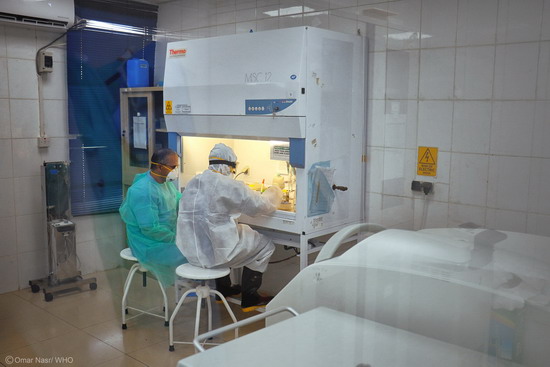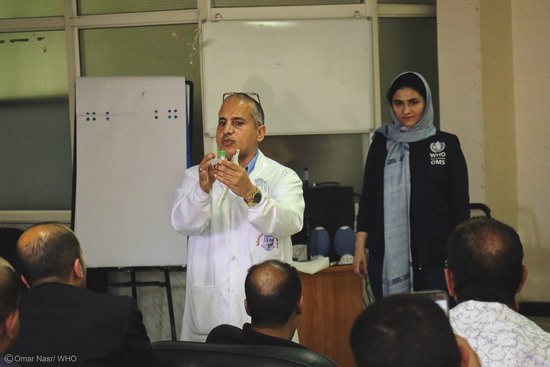 Dr Ali Abdulla, laboratory specialist and health director at the National Center of Public Health Laboratories in Sana’a
Dr Ali Abdulla, laboratory specialist and health director at the National Center of Public Health Laboratories in Sana’a
27 May 2020 – “I can only spend half an hour with my 7 children each day before I leave to work in the morning, since my workday doesn’t end until 3:00 a.m.,” says Dr Ali Abdulla, laboratory specialist and health director at the National Center of Public Health Laboratories in Sana’a. Since the beginning of the pandemic in Yemen, Dr Ali has been working non-stop in the laboratory despite the fact that he has not been paid in months.
On 10 April 2020, the Ministry of Public Health and Population announced the first laboratory confirmed case of the coronavirus in Hadramout in Yemen. As of now, local health authorities are reporting 126 laboratory-confirmed cases of COVID-19 with 19 associated deaths from several governorates.
“We hope that health workers in laboratories across the country who support the testing of COVID-19 are not forgotten. Our families need our support, just like the health system in Yemen needs us to support it,” he adds.
Reduced operational capacity of 50% of health facilities that are still functional affect the productivity of health workers and overwhelms them. Not to mention the limited number of skilled health workforce that is vulnerable; there are no doctors in 18% of districts across the country and most health personnel have not received salaries for more than 2 years making the system unable to fill the deficit in human resources for health. In addition to the brain drain which has led to loss of many of the most skilled health professionals who have been forced to flee the country for reasons of security and safety.
 Dr Ali Abdulla conducting a COVID-19 training of RRTs at the National Center of Public Health Laboratories in Sana’a
Dr Ali Abdulla conducting a COVID-19 training of RRTs at the National Center of Public Health Laboratories in Sana’a
The health care workforce in Yemen – these men and women are the country’s true heroes
For weeks now, a United Nations-wide COVID-19 task force has been scaling up preparedness and response efforts, harnessing the capacity of the entire UN country team in Yemen, to ensure we have a fighting chance. However, the unprecedented financial gap WHO is facing under the Yemen Humanitarian Response Plan is not allowing us to continue the payments beyond March. Despite Yemen being the largest humanitarian crisis in the world, the availability of funds remains a concern and the response plan remains heavily under-funded.
“As yet another public health risk threatens to ravage the country, now more than ever, countries like Yemen need a protected WHO. I call on all parties, all partners, and authorities to safeguard the vital work of WHO and the United Nations system in Yemen. Only with unity, solidarity, and collective action can the lives of millions of innocent Yemenis be spared from this potential catastrophe,” says Altaf Musani, Representative of WHO in Yemen.


